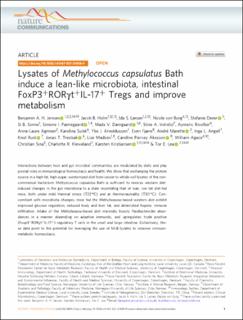Lysates of Methylococcus capsulatus Bath induce a lean-like microbiota, intestinal FoxP3+RORγt+IL-17+ Tregs and improve metabolism
Jensen, Benjamin Anderschou Holbech; Holm, Jacob B.; Larsen, Ida S.; von Burg, Nicole; Derer, Stefanie; Sonne, Si B.; Pærrgaard, Simone I.; Damgaard, Mads V.; Indrelid, Stine Hufthammer; Rivollier, Aymeric; Agrinier, Anne-Laure; Sulek, Karolina; Arnoldussen, Yke Jildouw; Fjære, Even; Marette, André; Angell, Inga Leena; Rudi, Knut; Treebak, Jonas Thue; Madsen, Lise; Åkesson, Caroline Piercey; Agace, William; Sina, Christian; Kleiveland, Charlotte Ramstad; Kristiansen, Karsten; Lea, Tor Erling
Peer reviewed, Journal article
Published version
Permanent lenke
https://hdl.handle.net/11250/2764532Utgivelsesdato
2021Metadata
Vis full innførselSamlinger
- Articles [3009]
- Publikasjoner fra CRIStin [3056]
Sammendrag
Interactions between host and gut microbial communities are modulated by diets and play pivotal roles in immunological homeostasis and health. We show that exchanging the protein source in a high fat, high sugar, westernized diet from casein to whole-cell lysates of the non-commensal bacterium Methylococcus capsulatus Bath is sufficient to reverse western diet-induced changes in the gut microbiota to a state resembling that of lean, low fat diet-fed mice, both under mild thermal stress (T22 °C) and at thermoneutrality (T30 °C). Concomitant with microbiota changes, mice fed the Methylococcus-based western diet exhibit improved glucose regulation, reduced body and liver fat, and diminished hepatic immune infiltration. Intake of the Methylococcu-based diet markedly boosts Parabacteroides abundances in a manner depending on adaptive immunity, and upregulates triple positive (Foxp3+RORγt+IL-17+) regulatory T cells in the small and large intestine. Collectively, these data point to the potential for leveraging the use of McB lysates to improve immunometabolic homeostasis.
